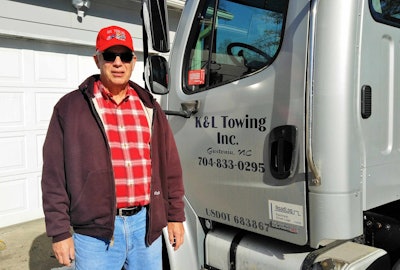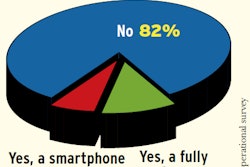Click on this link to return to the anchor piece in this series.
 Gastonia, N.C.-based hotshot owner-operator Buster Lewis, with his 2006 Freightliner Business Class straight flatbed
Gastonia, N.C.-based hotshot owner-operator Buster Lewis, with his 2006 Freightliner Business Class straight flatbedK&L Towing owner-operator Buster Lewis got his start in trucking in 1999. He was a tow operator, hauling cars locally and other freight farther with a straight truck rollback flatbed, today in a similarly equipped 2006 Freightliner Business Class.
On one of those early longer runs, a Georgia state trooper gave Lewis what amounted to an education in hours of service regulations. With his truck tagged at under 26,000 pounds, he didn’t need a CDL but, as he recalls, “didn’t realize I had to keep logs.”
That changed when a trooper at an Atlanta weigh station explained that when Lewis was out of the short-haul air-mile radius, he needed a log book just like every other commercial freight hauler. “He kept us there and then took us down to a truck stop and showed us how to fill out a log book,” Lewis remembers.
Over the years, he dealt with paper logs when needed, being outside of the air-mile radius. Then he increasingly found himself keeping logs as the business shifted further toward long-haul freight.
Shortly after he got a contract hauling steel rebar from an area manufacturer, he came across an advertisement for Continental’s VDO RoadLog electronic log, the only dedicated e-log that does not come with a monthly service fee. The simplicity of the logging device – about $700 for installation in the truck and a program on his desktop for transferring, reviewing and storing log data – was attractive. Likewise appealing was removing the hassle of keeping paper logs, not to mention the time saved on inspections.

A sticker on his truck advertising his use of the system has helped at weigh stations, Lewis says. Give officers plenty of opportunity to “notice you’ve got an electronic log on your truck,” and “they aren’t going to bother you.”
Operationally, the switch was simple for him, he says, given his mix of business usually allows him to be in and out of a dock in an hour or less. Maxing out the 14 hours of on-duty time is a non-issue, he says.










